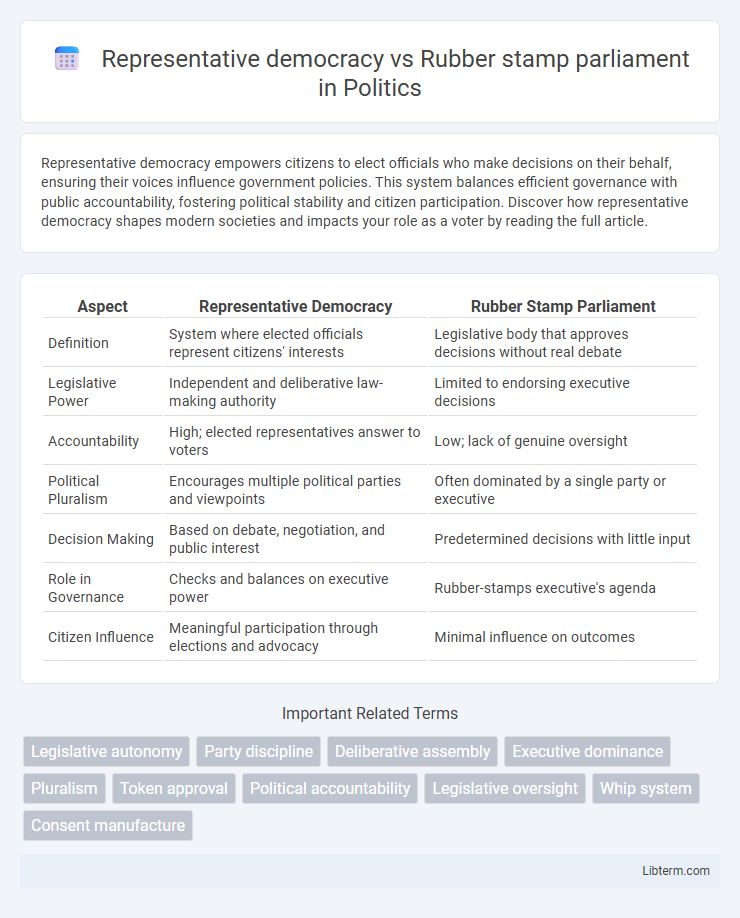Representative democracy empowers citizens to elect officials who make decisions on their behalf, ensuring their voices influence government policies. This system balances efficient governance with public accountability, fostering political stability and citizen participation. Discover how representative democracy shapes modern societies and impacts your role as a voter by reading the full article.
Table of Comparison
| Aspect | Representative Democracy | Rubber Stamp Parliament |
|---|---|---|
| Definition | System where elected officials represent citizens' interests | Legislative body that approves decisions without real debate |
| Legislative Power | Independent and deliberative law-making authority | Limited to endorsing executive decisions |
| Accountability | High; elected representatives answer to voters | Low; lack of genuine oversight |
| Political Pluralism | Encourages multiple political parties and viewpoints | Often dominated by a single party or executive |
| Decision Making | Based on debate, negotiation, and public interest | Predetermined decisions with little input |
| Role in Governance | Checks and balances on executive power | Rubber-stamps executive's agenda |
| Citizen Influence | Meaningful participation through elections and advocacy | Minimal influence on outcomes |
Introduction to Representative Democracy and Rubber Stamp Parliament
Representative democracy empowers citizens to elect officials who make legislative decisions on their behalf, ensuring accountability and diverse perspectives influence governance. Rubber stamp parliaments, by contrast, merely approve decisions made by a dominant executive or party without meaningful debate or opposition, undermining democratic principles. The distinction highlights how genuine representative institutions facilitate public participation, while rubber stamp bodies serve as symbolic enforcers of centralized power.
Defining Representative Democracy
Representative democracy is a political system where elected officials act on behalf of citizens, making decisions through transparent legislative processes and accountable governance. It emphasizes citizen participation, rule of law, and separation of powers to prevent authoritarian control, ensuring that laws reflect public interests. In contrast, a rubber stamp parliament merely approves decisions made by the executive branch without meaningful debate or oversight, undermining democratic principles.
Characteristics of a Rubber Stamp Parliament
A Rubber Stamp Parliament lacks genuine legislative power, often approving decisions made by the executive without meaningful debate or opposition. Its characteristics include limited scrutiny of laws, absence of independent voting by members, and a predominant role as a formal endorsement body rather than a decision-making institution. This contrasts starkly with representative democracy, where elected officials actively deliberate and shape policy reflecting their constituents' interests.
Key Differences Between the Two Systems
Representative democracy empowers elected officials to make decisions reflecting the electorate's interests through genuine debate and accountability, ensuring diverse viewpoints influence legislation. Rubber stamp parliaments merely approve decisions made by a dominant authority without meaningful scrutiny, undermining democratic principles and limiting political pluralism. Key differences include the level of legislative independence, transparency in decision-making, and the presence of checks and balances on executive power.
Historical Origins and Evolution
Representative democracy originated in ancient Athens, where citizens elected officials to deliberate and make decisions on their behalf, evolving significantly during the Enlightenment with thinkers like John Locke advocating for popular sovereignty and separation of powers. Rubber stamp parliaments emerged in authoritarian regimes, where legislative bodies merely endorse executive decisions without genuine debate or legislative autonomy, often seen in historical contexts like Tsarist Russia or totalitarian states of the 20th century. Over time, representative democracy has spread globally, emphasizing checks and balances, while rubber stamp parliaments persist mainly in non-democratic governments, highlighting the contrast in political legitimacy and citizen participation.
Impact on Governance and Policy-Making
Representative democracy fosters accountable governance by ensuring elected officials deliberate diverse citizen interests, leading to more balanced and responsive policies. Rubber stamp parliaments, characterized by limited legislative independence, often result in expedited but less scrutinized policy-making, which can undermine transparency and reduce public trust. Consequently, the quality of governance in representative democracies generally surpasses that of rubber stamp parliaments due to stronger checks and balances.
Role of Elected Officials: Accountability vs. Compliance
In representative democracy, elected officials hold accountability to their constituents by actively making decisions that reflect public interests and policy priorities. In contrast, a rubber stamp parliament features officials who primarily comply with the directives of a dominant power, with limited independent judgment or scrutiny. This fundamental difference shapes governance, as accountability drives responsiveness and transparency, while compliance often leads to centralized control and diminished political pluralism.
Public Participation and Political Engagement
Representative democracy fosters active public participation by enabling citizens to elect officials who genuinely reflect their interests and hold decision-making power. In contrast, a rubber stamp parliament exhibits minimal political engagement, as elected representatives merely approve decisions made by an elite group without meaningful debate or public input. Enhanced political engagement in representative democracies leads to more accountable governance and stronger democratic legitimacy.
Consequences for Human Rights and Civil Liberties
Representative democracy safeguards human rights and civil liberties by enabling elected officials to be accountable to the public, ensuring laws uphold freedoms such as speech, assembly, and equality. A rubber stamp parliament undermines these protections by acting as a mere formality, allowing unchecked executive power to suppress dissent and violate civil liberties without effective legislative oversight. This erosion of democratic mechanisms often leads to systematic human rights abuses and diminished public participation in governance.
Case Studies: Real-World Examples and Lessons
In representative democracies like the United States and Germany, elected officials exercise genuine legislative power and accountability, fostering policy responsiveness and citizen participation. Conversely, rubber stamp parliaments in countries such as North Korea and Syria primarily serve to legitimize executive decisions without meaningful debate or opposition, resulting in authoritarian entrenchment and limited political freedoms. Case studies reveal that robust institutional checks and transparent electoral systems are critical for ensuring legislative independence and preventing democratic backsliding.
Representative democracy Infographic

 libterm.com
libterm.com